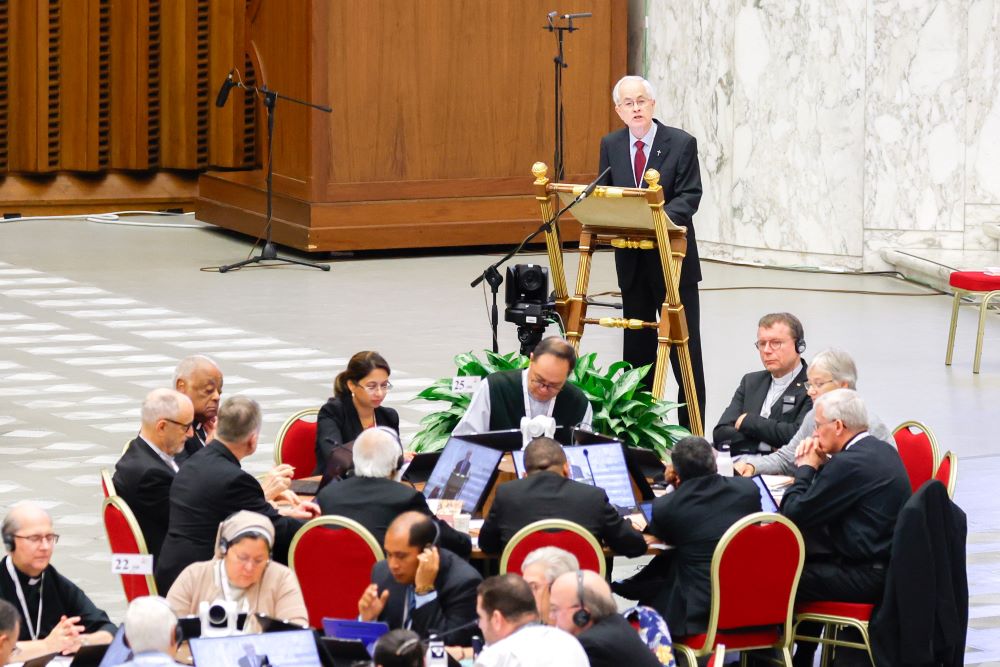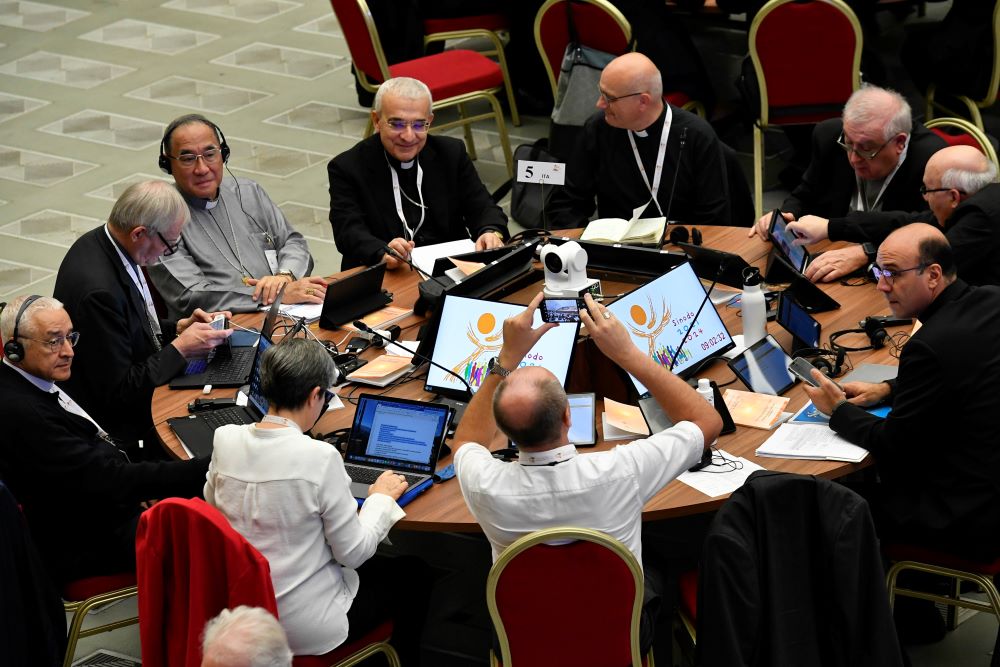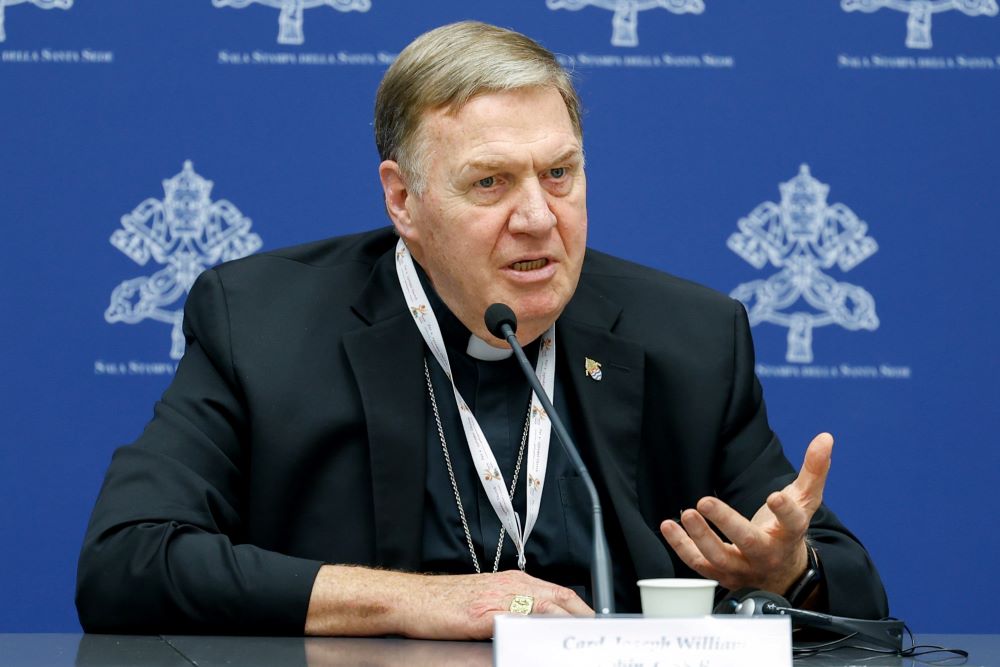
Fr. Ormond Rush, a theologian from Australia, speaks during a working session of the assembly of the Synod of Bishops in the Vatican's Paul VI Audience Hall Oct. 23. (CNS/Lola Gomez)
This is the last full week of the synod on synodality in Rome. Much to everyone's surprise, the pope's request to the delegates that they not discuss with the media what is transpiring inside the aula has largely held. Those of us who have to provide analysis have only a few tea leaves on which to draw, and perhaps that has allowed us to think more deeply about why the synod is — and isn't — working.
What do those tea leaves portend? The synod is forging a new kind of intra-ecclesial conversation that is the opposite of what has passed for conversation recently. Specifically, the synodal conversation is rooted in the ecclesiology of Vatican II, it is not subject to the pathologies of social media and it is reinstating the Vincentian canon as a model for ecclesiology.
On what basis can we make such large, albeit tentative, conclusions? Cardinal Joseph Tobin, the Archbishop of Newark, has been posting weekly videos on the archdiocesan YouTube channel.
In the video at the end of the second week, Tobin noted the diversity of his group, an English-speaking group that included a mother from Ukraine, a young woman from Russia, someone from Malaysia and another from Singapore. So, the diversity of the group was not merely geographic, but also in terms of roles within the church. Tobin discussed the ways that their common baptism became a point of departure for the conversations that followed. He is echoing Vatican II's "Dogmatic Constitution on the Church," Lumen Gentium, which offers a variety of metaphors for understanding the Catholic Church and corrects the overemphasis on the papacy that dominated the First Vatican Council.
There is a revolution afoot at the synod, and it doesn't have to do with who gets ordained or any particular hot-button issue.
Cardinal Michael Czerny, prefect of the Dicastery for Integral Human Development, also rooted his comments about the synod in Vatican II in his conversation with my colleagues Joshua McElwee and Christopher White on "The Vatican Briefing" podcast. Czerny noted that the synod is "a reminder that our prayer is not dictated by what are the headlines, no matter how alarming, but by the needs of God's people, and those needs are very acute and very pressing, really, around the world." Here the echo comes from Gaudium et spes, the "Pastoral Constitution on the Church in the Modern World." There, it is the "joys and hopes" of humankind that demand solidarity from the church. In attending to the signs of the times, we do not look for grievance but for grace, for evidence that the Holy Spirit is at work. And we do not look for ideological narratives but for instances of acute human suffering because that is where grace abounds all the more (Corinthians 9:8).
In that same short video at the end of the second week, Tobin said, "It was a good week. It wasn't an easy week." Posting on social media is easy — easy and cheap. Social media rewards outrage and the outrageous, not wisdom and the sublime. Conversations on social media are almost exclusively superficial and when they are not just nasty, they tend to become glib. Glibness is every bit the opposite of holiness as evil. Whenever Pope Francis warns against worldliness, I suspect he knows glibness is on the top 10 list of worldly temptations.

Participants at the assembly of the Synod of Bishops gather for prayer and discussion Oct. 21, in the Paul VI Audience Hall at the Vatican. (CNS/Vatican Media)
Why is the conversation difficult? In his remarks opening the final week of the synod, Fr. Ormond Rush, a theologian from Australia, turned to another Vatican II text to highlight the challenge facing the synod, Dei Verbum, the "Dogmatic Constitution on Divine Revelation." He said:
In Dei Verbum — and this is important for understanding synodality and the very purpose of this Synod — this divine revelation is presented as an ongoing encounter in the present, and not just something that happened in the past. The event of God's self-revealing (always in Christ, through the Holy Spirit) and God's offer of relationship, continues to be a living reality here and now. That doesn't mean there can be some new revelation of who God is. But, the same God, in the same Jesus Christ, through the enlightenment and empowerment of the same Holy Spirit, is forever engaging with, and dialoguing with, human beings in the ever-new here and now of history that relentlessly moves humanity into new perceptions, new questions and new insights, in diverse cultures and places, as the world-church courses through time into an unknown future until the eschaton.
The phrase "unknown future" is unfortunate. We know rather a lot about the future of a church that is both faithful and bold. Still, Rush is right to insist on the shift from abstract propositions to relationships, from ideas to encounters, as characteristic of that "living tradition" that animated the Second Vatican Council and that was so dear to the heart of Pope Benedict XVI, among other prominent theologians. It was telling that Rush quoted extensively from Joseph Ratzinger's book Theological Highlights of Vatican II.

Cardinal Joseph Tobin of Newark, New Jersey, speaks during a briefing about the assembly of the Synod of Bishops at the Vatican Oct. 10. (CNS/Lola Gomez)
Archbishop Anthony Fisher of Sydney, Australia, gave an interview to the National Catholic Register that can be read, in part, as a response to Rush. "We already have a whole body of teaching, of reflection, by thousands and thousands of people down through the generations, guided by the Holy Spirit on all sorts of questions there to help us, the deposit of faith as we call it, it's there to be mined," Fisher said. I wonder if he would be kind enough to let us know when that all stopped. In other parts of the interview, he was dismissive and almost churlish, especially in the way he discussed the role of women in the church.
In his video update after the third week, Tobin spoke about the three central themes of the synod. "Now those three priorities — communion, mission and participation — they sound like Greek gobbledygook. But I think that most of the elements of our archdiocesan report could be identified in one or more of these priorities," he said. "It was encouraging for me to hear our delegate from the other side of the world voice the same concerns as folks in Hudson County."
Advertisement
The Vincentian canon, named for St. Vincent of Lerins, reflects on how a person is to distinguish truth from error. "Now in the Catholic Church itself, we take the greatest care to hold that which has been believed everywhere, always and by all," wrote the Gallican monk in 434 A.D.
There are those who confuse what they believe, and how they interpret their beliefs, with the whole. Others think that just because they are Catholic and they have a thought, it is a Catholic thought that has been had. This, also, is false. And St. Vincent pointed out the need to inform ourselves by drinking deeply in the tradition: "But what if some novel contagion try to infect the whole Church, and not merely a tiny part of it? Then he will take care to cleave to antiquity, which cannot now be led astray by any deceit of novelty."
The naysayers about the synod, and those who insist that the synod reach specific decisions on specific topics, are both missing the boat. There is a revolution afoot at the synod, and it doesn't have to do with who gets ordained or any particular hot-button issue. We are learning how to have a different kind of conversation within the Catholic Church, one that gives voice to all the baptized, avoiding the clericalism and ultramontanism of recent centuries. It is not clear why that worries some people or seems insufficient for others. What is happening in Rome is extraordinary.







